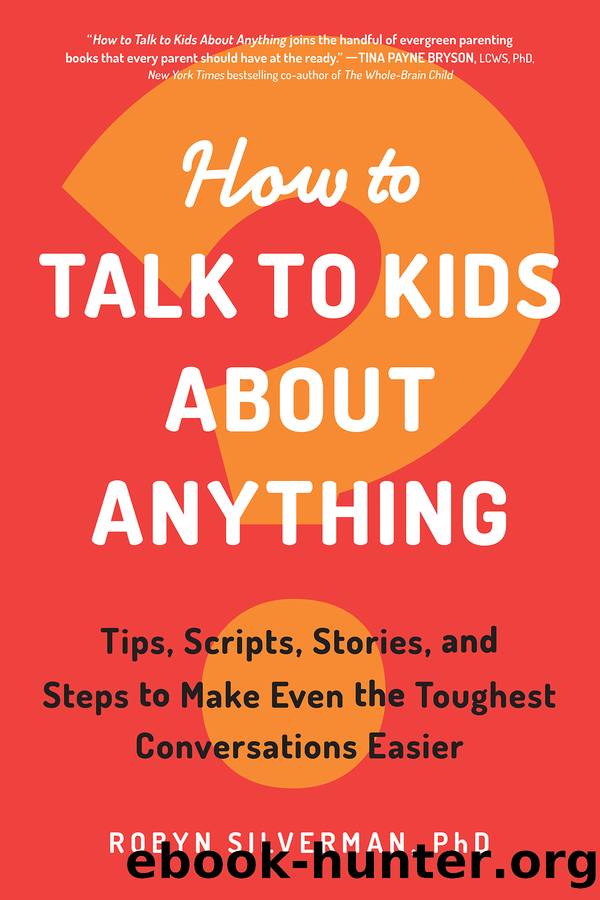How to Talk to Kids About Anything by Robyn Silverman

Author:Robyn Silverman [Silverman, Robyn]
Language: eng
Format: epub
Publisher: Sourcebooks
Blended Families
Blended families have become incredibly common as divorced, previously single, and widowed parents date, remarry, and mesh their families together. According to the U.S. Census Bureau, about one in six kids are living in blended familiesâthat is, a household with a stepparent, stepsibling, or half sibling. Hispanic, Black, and white children are uniformly likely to live in a blended family.39
Blended families have some unique challenges related to their family structure. They must deal with any pain from the divorce and past relationship, the complexities of new relationships, and the unique obstacles that come with creating one family from two. As parents and stepparents (or âbonus parents,â if you are using family-positive language), we need to step up and have important conversations with our kids about fear, loss, inclusion, empathy, and connection that tie the binds between biological family members and new family membersâall while dealing with our own frustrations and feelings.
âThereâs absolutely no blending, no co-parenting, no being a great person, unless you do the self-work,â says Mashonda Tifrere, author of Blend: The Secret to Co-Parenting and Creating a Balanced Family, regarding how her family with ex-husband, Swizz Beatz, and his wife, Grammy Awardâwinning singer Alicia Keys, created a parenting team.40 Of course, nobody says itâs easy, but it certainly has its advantages when everyone works together for the good of the child. âBlending is a lifestyle,â Tifrere said. âWe all win if we can raise mindful, loving, and empathetic children,â and âthat process starts at home with parents and caregivers. By saving our families, we save our present and our future.â41
In the How to Talk to Kids about Anything podcast, I spoke to Ron Deal, coauthor of Building Love Together in Blended Families, about two tough issues regarding blended families:42
As a stepparent or âbonus parent,â I donât know what to do when the kids start talking about their deceased parent in front of me. Should I stay? Should I leave? Should I join in?Explanation: While you may never have met your âbonus childrenâsâ deceased parent, being present while the kids talk about that special person can show kindness, affection, and empathy. In fact, itâs a real act of love when you allow the kids to talk about the parent they lost in front of you.
Sample script: âWow, he was a great guy. I really wish I could have met him. Tell me that story again about when he did that funny thing!â Sit with them when they are sad, and give them space when they want to be alone.
Final word: Deal says, âWhen you enter that sad place with them, they will see you as respectable, honorable, and worthy of being close to, as they can trust you with the hard stuff.â In addition, you are showing them that whatâs important to them is also important to you. After all, their deceased parent is part of them and always will be.
Download
This site does not store any files on its server. We only index and link to content provided by other sites. Please contact the content providers to delete copyright contents if any and email us, we'll remove relevant links or contents immediately.
Should I Stay or Should I Go? by Ramani Durvasula(7667)
The Lost Art of Listening by Michael P. Nichols(7506)
The Rosie Project by Graeme Simsion(6412)
Beartown by Fredrik Backman(5751)
We Need to Talk by Celeste Headlee(5614)
Ego Is the Enemy by Ryan Holiday(5445)
Hunger by Roxane Gay(4927)
Suicide Notes by Michael Thomas Ford(4826)
I Love You But I Don't Trust You by Mira Kirshenbaum(3875)
Mummy Knew by Lisa James(3691)
Not a Diet Book by James Smith(3425)
Crazy Is My Superpower by A.J. Mendez Brooks(3400)
Toxic Parents by Susan Forward(3291)
Girl, Wash Your Face by Rachel Hollis(3282)
The Complete Idiot's Guide to Coping With Difficult People by Arlene Uhl(3149)
The Social Psychology of Inequality by Unknown(3029)
Name Book, The: Over 10,000 Names--Their Meanings, Origins, and Spiritual Significance by Astoria Dorothy(2987)
The Hard Questions by Susan Piver(2972)
The Gaslight Effect by Dr. Robin Stern(2793)
